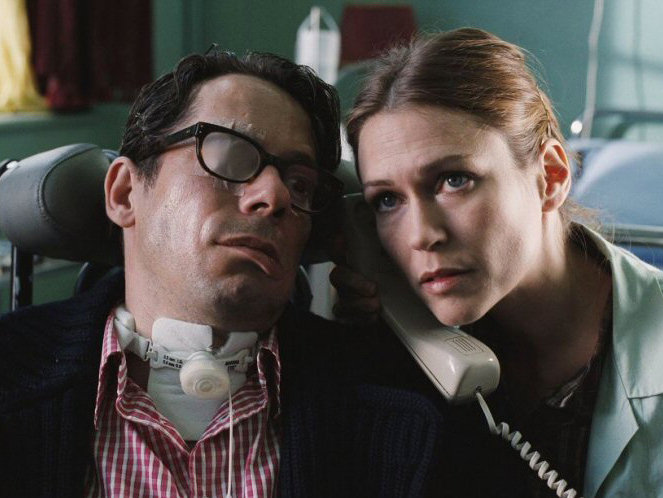Bayside resident Mark Metcalf is an actor who has worked in movies, TV and on the stage. He is best known for his work in "Animal House," "Buffy the Vampire Slayer" and "Seinfeld."
In addition to his work on screen, Metcalf is involved with the Milwaukee International Film Festival, First Stage Children's Theater and a number of other projects, including the comedy Web site, comicwonder.com.
He also finds time to write about movies for OnMilwaukee.com. In this week's installment of the Screening Room, Mark looks at "Wit" and "The Diving Bell and the Butterfly."
WIT (2001)
There is a moment late in the film "Wit" that tells me a lot about Mike Nichols, the director, and why this film isn't more moving and therefore wasn't more successful. It is a wonderful moment between Emma Thompson's character and Audra McDonald's character.
Thompson plays a professor of 17th Century English literature, specifically John Donne, who is dying of ovarian cancer. McDonald is the primary nurse in the hospital where Thompson is trying to recover from an illness brought on by the intense chemotherapy that she has been undergoing, and from the cancer.
There is a misunderstanding about the meaning of the word soporific and when Thompson explains it to McDonald they both enjoy a laugh, at themselves mostly, they let go a little, and it is one of the most human and intimate moments in the film up until that point.
As they laugh in genuine enjoyment of each other, Nichols pulls the camera back, dollies back, out of the room and the curtains are drawn and we are removed from the people and into the cold, sterile hall of the hospital. We are denied the warmth, the affection, the humanity of a shared silliness and the underlying recognition of the inevitability of death and pain.
It is almost as though Nichols himself is embarrassed to be present at such a moment, and he removes himself and therefore us, the audience.
It is too bad. Watching a woman die of cancer -- especially a woman isolated from people and the warmth of companionship, consumed by her own intellect, scholarship, and a wisdom gained, for all we know, only through literature - is difficult, particularly when she is in a cold environment, surrounded primarily by cold care-givers . It is not something that most people would choose to do. They would not choose to watch this film.
Most of what we know about Thompson's character comes from her direct address to the camera. It is a compelling performance, full of wit and wisdom. Thompson also wrote the screenplay with Nichols from a play by Margaret Edson. When an actor talks directly to you, breaking the fourth wall as we say in the industry, they expose themselves in an unorthodox way, but they also put themselves in control of the situation. You hear and see what they chose for you to hear and see. It is their show.
Of course, the director is always in the God-like position of making the ultimate choices. He/she chooses to let you see behind or beyond what the character is telling you. Nichols takes this position when he removes himself and us from the room at the moment that the professor is actually enjoying herself, as much as a person can enjoy himself or herself when they are eaten up by cancer and debilitated by the cure. It seems, at that moment, that Nichols is a God made uncomfortable by human feelings, perhaps by human beings altogether, unless they are in pain. That is not a God that I would want sharing my universe, if I had a choice. And you do have a choice about whether to watch this movie or not.
On the other hand, "Wit" makes dying alone, unloved and unloving, seem a terrible price to pay for a deep intellectual passion for literature. By doing so, it makes me want to build bridges to any that might care well before I slip off into a comma, or dementia, or blithering idiocy, whatever awaits me near the end of the line. So, it has a positive effect in that rather morbid way.
Julian Schnabel directed this film. And it is the first time in a long time that I feel a director has really taken over and imprinted himself on the entire experience of a film.
The story is a true story. It is taken from a book by the same name written by the central character, Jean-Dominique Bauby. Bauby was the editor of the French Elle magazine, led a glamorous life, surrounded by fashion and glamour, a beautiful wife and two children, a mistress who loved him beyond reason and in the midst of his life, at 42 years of age, he had a stroke that left him entirely paralyzed except for his left eye. The film begins as he is coming out of a coma after everything has been done to save his life.
The film is shot almost entirely from his point of view, with blurred, out of focus images as seen through his one runny eye, an eye that he can't control. After twenty minutes or so it opens up and there are a few flashbacks and memory sequences, and scenes of pure imagination, but it always returns to the eye that sees but cannot move, can only be moved by nurses or therapists as they rearrange his helpless body in a bed or a chair.
In a remarkable way, that I may never be able to understand, Schnabel takes us totally inside the body, the mind and the heart, of this man who has lost everything except his one eye and his imagination, and we live with him as he discovers his deep and abiding need to communicate.
Bauby, or Jean-Do, as he is affectionately called by those friends and family who visit him, learned, with the help of a speech therapist, to communicate by spelling out words. A therapist, and eventually friends, would slowly recite the alphabet and when they reached the letter that Jean-Do was thinking of he would blink once. That letter would be written down and the alphabet recited again until the next letter in the word he was thinking of was reached and again the eye would blink, that letter written down, and again, and again until the therapist would guess the word, say it and the eye would blink once to signify that it was the correct word.
Jean-Dominique Bauby died six weeks after his book, "The Diving Bell and the Butterfly," was published. He wrote an entire book, a memoir of his experiences, in this painstaking manner. We experience the whole process from inside the mind, viewed by the eye of this man. Perhaps once, maybe twice, there is a shot that is from a point of view other than Jean-Do's, and even that may well be his imagination at work, the way he imagines a scene to be taking place if he were able to move.
It sounds hideously difficult to watch, doesn't it? I am sure it was hideously difficult to live. But Schnabel offers us the opportunity to become extremely intimate with the phenomenal heroism of Bauby's effort, and with the strength, the faith, and the affection and love of the people who stayed with him throughout the ordeal. And by the time the film ends, you feel only that you have witnessed and act of tremendous beauty. And Schnabel, as well as Bauby, is responsible for that beauty.
It is filmmaking of a very different order than most films. It exists on a higher plane. At every level, from the intimacy of the story, to the astonishing beauty of the camera work and the editing, to the truth and the reality of the acting, this film may be without peer in my experience.
I don't know why the two films I chose to review this week are both about people bound to beds by disease or affliction of some terrible and terminal kind. I don't know why. I don't think I'll do it again for a while. But whereas one, "Wit," fails to do anything more than make be dread dying and it's end result, death, the other, "The Diving Bell and the Butterfly," is really beautifully uplifting in the way it celebrates life, and faith, and love, and courage, and the human spirit as it continually reaches out to communicate against all obstacles.
Mark Metcalf is an actor and owner of Libby Montana restaurant in Mequon. Still active in Milwaukee theater, he's best known for his roles as Neidermeyer in "Animal House" and as The Maestro on "Seinfeld."
Originally from New Jersey, Metcalf now lives in Bayside.



